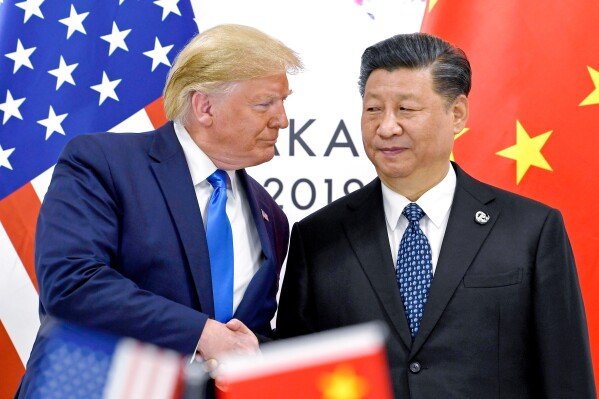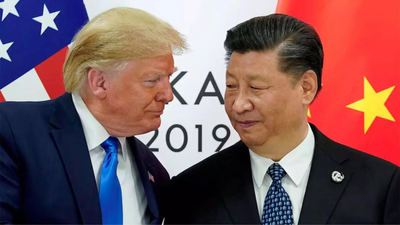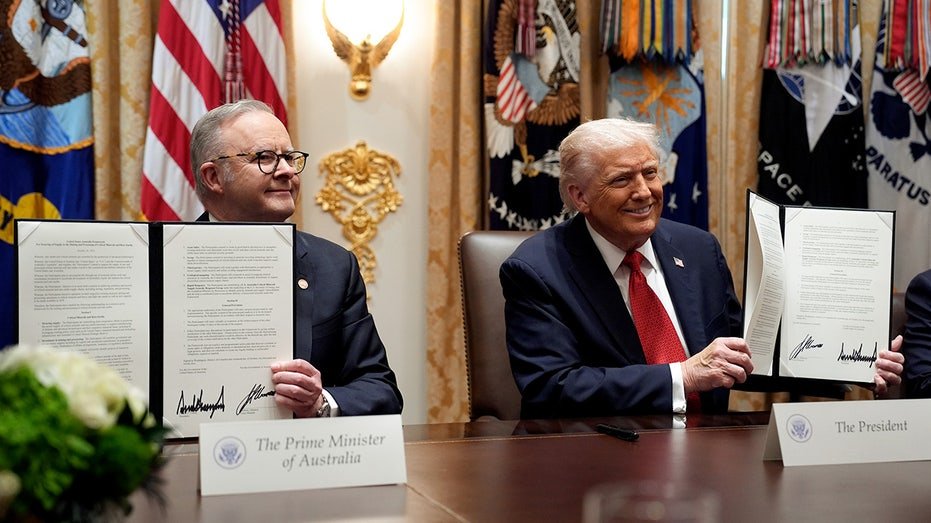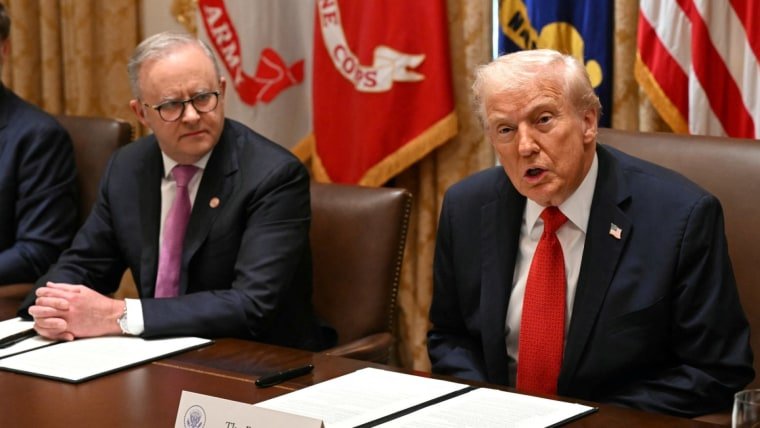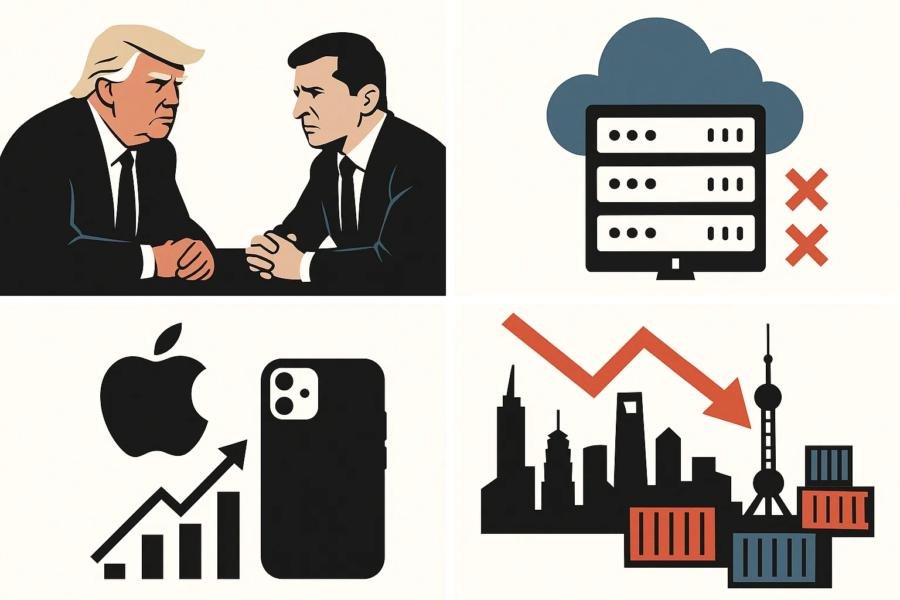Key findings

- Across 25 countries surveyed, a median of 53% of adults trust the European Union to regulate AI effectively, while 34% do not.
- A median of 54% across the nine EU member nations surveyed trust the organization to regulate AI, while 48% across the non-EU countries surveyed say the same.
- A median of 37% trust the U.S. to regulate AI effectively, while 48% do not.
- A median of 27% trust China to regulate AI effectively, while 60% do not.
Trust varies by several factors. For example, people who hold favorable views of the EU, the U.S. and China are more likely to trust they can regulate AI effectively. And people who are more excited than concerned about the increased use of AI also tend to have more trust in these actors to regulate it.
Younger adults tend to express higher levels of trust in China – and, to a lesser extent, in the U.S. – to regulate AI when compared with older adults.
Trust in the EU to regulate use of AI
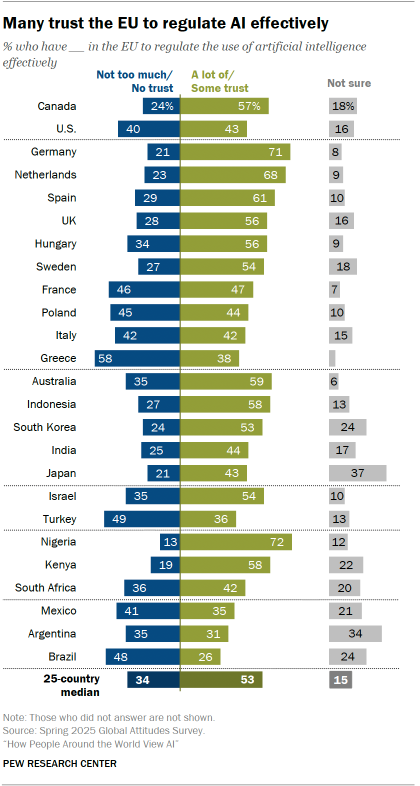
Across the 25 countries surveyed, a median of 53% of adults trust the EU to regulate AI use, while a median of 34% do not.
Trust in the EU varies widely among member nations. Adults in Germany and Netherlands are the most trusting: Around seven-in-ten express some or a lot of trust in the EU to regulate AI effectively. In Greece and Italy, by comparison, only around four-in-ten share this view.
Views vary in nonmember nations as well. Majorities of adults in Nigeria, Australia, Indonesia, Kenya and Canada trust the EU to regulate AI effectively. By contrast, roughly a third or fewer in Mexico, Argentina and Brazil say the same.
In the U.S., 43% trust the EU on AI regulation and 40% do not.
By opinion of the EU
In nearly all countries surveyed, people with a favorable view of the EU are more likely than those with an unfavorable view to trust the organization on AI regulation. In Poland, for example, 61% of adults with a favorable view of the EU trust it to regulate AI, compared with just 17% of those who have an unfavorable view of the EU.
By ideology
In some countries, people on the ideological right are less likely than those on the left to trust the EU to regulate AI. One of the largest ideological gaps is in the Netherlands, where 85% of those on the left trust the EU on this matter, compared with 61% on the right.
By support of right-wing populist parties
In Europe, people with a favorable opinion of some right-wing populist parties are less likely to trust the EU to effectively regulate AI. For example, 43% of Alternative for Germany (AfD) supporters trust the EU on this matter, compared with 78% of nonsupporters. (Read Appendix A for more information on how we classify populist parties.)
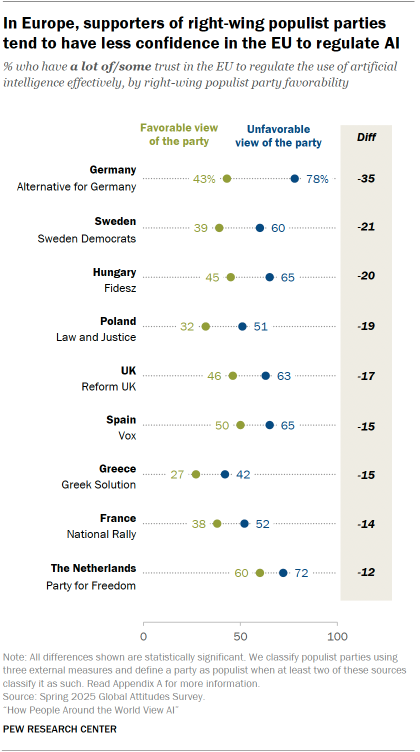
By views of AI
People who are more excited than concerned about the growing use of AI in daily life are generally more likely to trust the EU to regulate the technology effectively, compared with those who are more concerned than excited. In Greece, for example, 62% of those who are mainly excited about AI trust the EU to regulate it, compared with 30% of those who are mainly concerned.
By education
In 19 countries, adults with more education are more likely than those with less education to trust the EU to regulate AI. In the UK, for instance, 67% of people with a postsecondary education have at least some trust in the EU to regulate AI, compared with 49% of those with less education.
Trust in the U.S. to regulate use of AI
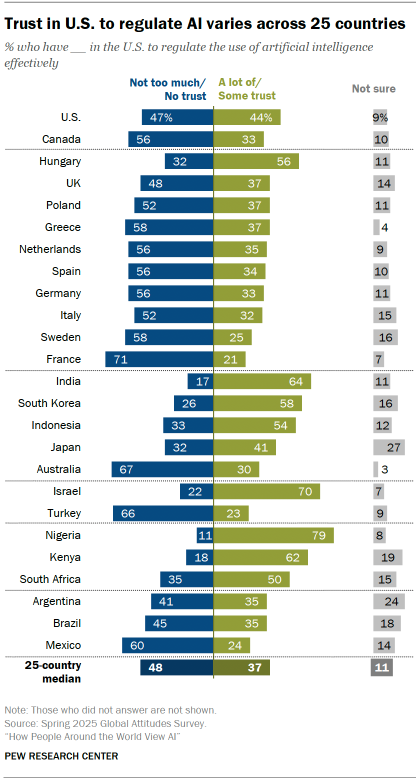
Across the 25 countries surveyed, a median of 37% of adults trust the U.S. to regulate the use of AI effectively, while a median of 48% do not.
People in Nigeria, Israel, India and Kenya stand out for their relatively trusting views, with six-in-ten adults or more reporting some or a lot of trust in the U.S. to regulate AI effectively. Half or more in South Korea, Hungary, Indonesia and South Africa also trust the U.S. to regulate AI effectively.
Americans themselves are split: 44% trust their country to regulate AI, while 47% do not. This partially reflects a partisan division, with Republicans and Republican-leaning independents more likely than Democrats and Democratic leaners to express a high level of trust (54% vs. 36%).
In the other 14 countries surveyed – including most of those in Europe – people broadly distrust the U.S. to regulate AI effectively.
By opinion of the U.S.
In every non-U.S. country surveyed, people with a favorable view of the U.S. are more likely than those with an unfavorable view to trust it on AI regulation. For example, in Turkey, 57% of those with a favorable view of the U.S. trust it to regulate the technology, compared with just 12% of those with an unfavorable view.
By views of AI
In 19 countries, people who are more excited than concerned about the increased use of AI in daily life are more likely to trust the U.S. to regulate it, compared with those who are more concerned than excited. In Brazil, for example, 58% of those who are mainly excited about increased AI use trust the U.S. to regulate it effectively, compared with 30% of those who are mainly concerned.
A similar pattern appears when respondents are asked about China, the EU and their own country: Those who are mostly excited about AI are generally more trusting about regulation.
By ideology
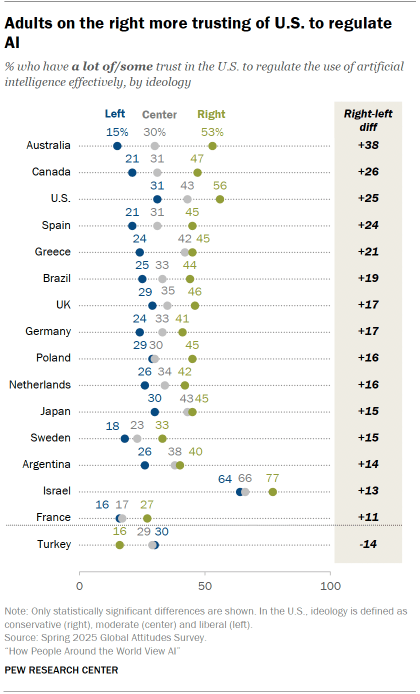
In 15 countries, people who place themselves on the ideological right express more trust in the U.S. to regulate AI effectively than those on the left.
This pattern appears in eight of the 10 European countries surveyed, with Spain showing one of the largest gaps (45% vs. 21%).
Outside of Europe, ideological divides emerge in eight countries. In Australia, for example, 53% of those on the right trust the U.S. to regulate AI, compared with 15% of those on the left. (For more on how we measure ideology in our cross-national surveys, read the report methodology.)
By support of right-wing populist parties
People who support right-wing populist parties in Europe are generally more trusting of the U.S. to regulate AI, compared with nonsupporters.
There are gaps on this question between supporters and nonsupporters of AfD in Germany, Brothers of Italy and Forza Italia, Fidesz and Jobbik in Hungary, Greek Solution, Law and Justice in Poland, National Rally in France, Party for Freedom in the Netherlands, Reform UK, and Vox in Spain.
By age
In 10 countries, adults ages 18 to 34 are more likely than those ages 50 and older to trust the U.S. to regulate AI. For example, 82% of young Nigerians trust the U.S. on this issue, compared with 65% of older Nigerians.
Trust in China to regulate use of AI
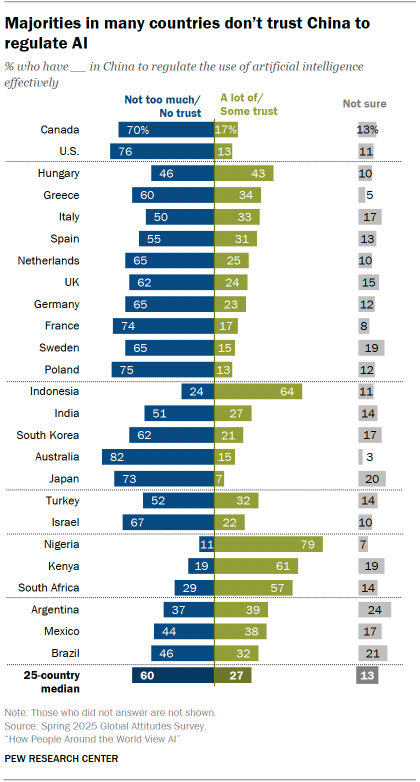
There is relatively little trust in China to effectively regulate AI across the 25 countries surveyed. A median of 27% trust China to regulate the technology, while a median of 60% do not.
People in Kenya, Nigeria and South Africa are more likely than not to trust in China’s handling of AI regulation. Adults in Indonesia also express more trust than distrust.
Elsewhere, views are much less trusting. Aside from Hungary and Italy, majorities of adults in all the European countries surveyed express little or no trust in China’s ability to regulate AI.
Americans are among the least trusting: Just 13% trust China to regulate AI effectively, while 76% do not. And only 7% of Japanese adults trust China to regulate AI.
By opinion of China
Across all 25 countries surveyed, people who hold a favorable view of China are more likely to express trust in the country’s ability to effectively regulate AI, compared with people who have an unfavorable view. In Turkey, for example, 55% of adults with a favorable opinion of China trust it on AI regulation, compared with 21% of those with an unfavorable opinion.
By views of AI
In 15 countries, people who are more excited than concerned about the growing use of AI in daily life tend to be more trusting of China to regulate the technology, compared with those who are more concerned than excited. In Mexico, for instance, 56% of those who are mainly excited about AI trust China on this matter, compared with 32% among those who are mainly concerned.
By age
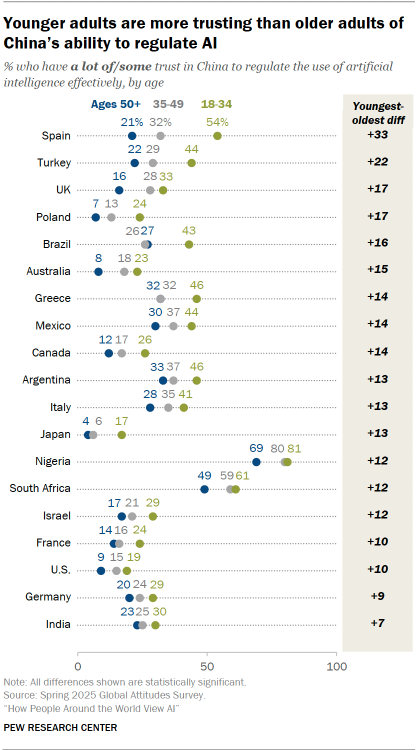
In 19 countries surveyed, adults under 35 are somewhat more trusting than those ages 50 and older on China’s ability to regulate AI. One of the larger age gaps is in Spain, where 54% of younger adults trust China on this issue, compared with 21% of older adults.
In several of these countries, adults ages 50 and older are more likely than those under 35 to say they are unsure if they trust China to regulate AI.
Beyond AI regulation, the survey also shows that, in most countries, younger people have more favorable views of China in general than older people.

